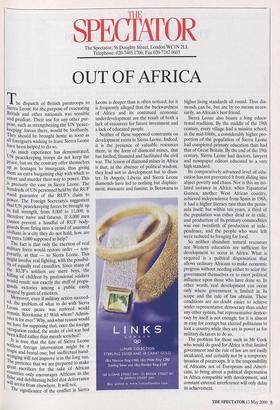The Spectator, 56 Doughty Street, London WC1N 2LL Telephone: 020-7405
1706; Fax 020-7242 0603
OUT OF AFRICA
The dispatch of British paratroops to Sierra Leone for the purpose of evacuating British and other nationals was sensible and prudent. Their use for any other pur- Pose, such as strengthening the UN 'peace- keeping' forces there, would be foolhardy. They should be brought home as soon as all foreigners wishing to leave Sierra Leone have been helped to do so.
As much experience has demonstrated, UN peacekeeping troops do not keep the Peace, but on the contrary offer themselves Up as hostages to insurgents, thus giving them an extra bargaining chip with which to extort and murder their way to power. This is precisely the case in Sierra Leone. The hundreds of UN personnel held by the RUF stand guarantor of the RUF's claim to Power. The Foreign Secretary's suggestion that UN peacekeeping forces be brought up to full strength, from 8,000 to 11,000, is therefore naive and fatuous. If 8,000 men cannot prevent a handful of RUF body- guards from firing into a crowd of unarmed civilians in a city they do not hold, how are an extra 3,000 supposed to help?
The fact is that only the exertion of real Military force would restore order — tem- porarily, at that — to Sierra Leone. This might involve real fighting, with the possibil- itY of equally real casualties. Since many of the RUF's soldiers are mere boys, the killing of children by professional soldiers would result: not exactly the stuff of propa- ganda victories among a public easily swayed by gusts of emotion. Moreover, even if military action succeed- ed, the problem of what to do with Sierra mane . once peace was restored would !.einain. Recolonise it? With whom? Admin- ister it for ever? Why, and what reason would We have for supposing that, once the foreign °)c-eilPation ended, the snake of civil war had been killed rather than merely scotched? It is true that the fate of Sierra Leone tragic foreign intervention might be a lragic and brutal one; but ineffectual hand- wringing will not improve it in the long run. The Pretence that we are prepared to make Fear sacrifices for the sake of African false only encourages Africans in the 4,18e and debilitating belief that deliverance will arrive from elsewhere. It will not. The significance of the conflict in Sierra
Leone is deeper than is often noticed; for it is frequently alleged that the backwardness of Africa and its continued economic underdevelopment are the result of both a lack of resources for future investment and a lack of educated people.
Neither of these supposed constraints on development exists in Sierra Leone. Indeed, it is the presence of valuable resources there, in the form of diamond mines, that has fuelled, financed and facilitated the civil war. The lesson of diamond mines in Africa is that, in the absence of political wisdom, they lead not to development but to disas- ter. In Angola, Liberia and Sierra Leone diamonds have led to nothing but displace- ment, massacre and famine; in Botswana to
higher living standards all round. Thus dia- monds can be, but are by no means neces- sarily, an African's best friend.
Sierra Leone also boasts a long educa- tional tradition. By the middle of the 19th century, every village had a mission school; in the mid-1860s, a considerably higher pro- portion of the population of Sierra Leone had completed primary education than had that of Great Britain. By the end of the 19th century, Sierra Leone had doctors, lawyers and newspaper editors educated to a very high standard.
Its comparatively advanced level of edu- cation has not prevented it from sliding into abject poverty and chaos. Nor is this an iso- lated instance in Africa: when Equatorial Guinea, another West African country, achieved independence from Spain in 1968, it had a higher literacy rate than the penin- sula itself; but within ten years, a third of the population was either dead or in exile, and production of its primary commodities was one twentieth of production at inde- pendence, and the people who were left were reduced to foraging for food.
So neither abundant natural resources nor Western education are sufficient for development to occur in Africa. What is required is a political dispensation that allows ordinary Africans to make economic progress without needing either to seize the government themselves or to exert political influence upon those who have done so. In other words, real development can occur only where government is limited in its scope and the rule of law obtains. These conditions are no doubt easier to achieve under representative democracy than under any other system, but representative democ- racy by itself is not enough; for it is almost as easy for corrupt but elected politicians to loot a country while they are in power as for military dictators to do so.
The problem for those such as Mr Cook who would do good for Africa is that limited government and the rule of law are not easily inculcated, and certainly not by a temporary invasion of paratroops. It is the responsibility of Africans, not of Europeans and Ameri- cans, to bring about a political dispensation in Africa compatible with development, and constant external interference will only delay its achievement.


























































 Previous page
Previous page